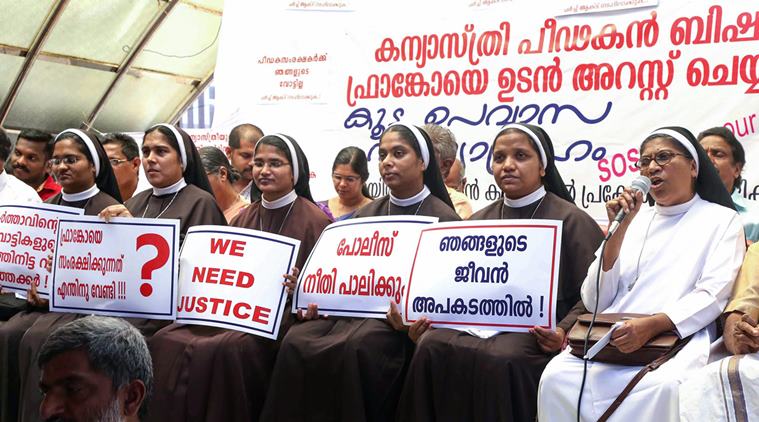
A reading of the elaborate 289-page judgment delivered by additional sessions judge, Kottayam, G Gopakumar, acquitting rape accused Franco Mulakkal, former Bishop of Jalandhar diocese, makes it seem that time has stood still since the infamous Mathura judgment in 1978 (Tukaram And Anr vs State Of Maharashtra, AIR 1979 SC 185), which triggered the women’s movement in India. In that case, the Supreme Court had acquitted two policemen who had raped a 16-year-old tribal girl in a police station on the ground that there were no marks of injury on her body and hence she had consented.
During the last 40 years, sustained campaigns by women’s organisations have resulted in significant changes in the rape law. The latest of these was the amendments brought about in 2013, following the brutal gangrape and murder of the 23-year-old paramedic in Delhi in 2012.
Through these amendments, the definition of rape under Section 375 of IPC, was expanded from the rigid peno-vaginal penetration to insertion of fingers, tongue or objects into the woman’s vagina, anus, mouth, as well as forcing the victim to touch or fondle the penis of the accused and other sexual acts. The term “rape” itself was redefined broadly as sexual assault of various types. So how can the victim/survivor be faulted for failing to use the archaic term “rape”, while describing the humiliating sexual acts she was allegedly forced to perform, by the accused?
From page 44 onwards, for the next 10-15 pages, the judgment puts on record the victim’s testimony that contains graphic descriptions of all that she was subject to on the very first night on May 5, 2014, including the accused forcing his penis into her mouth, ejaculating on her face, inserting fingers into her vagina. Do these acts not amount to sexual assault under the amended Section 375 of IPC? The victim then describes the other sexual acts she was forced to perform, including anal sex, oral sex, finger penetration, peno-vaginal penetration, during subsequent sexual assaults, each of which constitutes offences under Section 375, IPC. Even if a single act among these is proved — the nun alleged 13 separate instances of alleged rape in a span of four years — the accused would be liable for punishment under Section 376 of IPC.
Further, since it was proved that he was a person in authority as the patron of her congregation, the Missionaries of Jesus, these acts would amount to aggravated sexual abuse as there is an unequal power relationship between them. This is clearly brought out in the judgment itself, that though she was the Mother Superior of her congregation, the accused could ask her to carry his luggage and iron his garments.
In what could be read as eagerness to discredit the victim, and paint her as an unreliable witness, the judgment fails to dwell on these crucial ingredients of the amended Sections 375-376 of IPC. Instead, it goes into irrelevancies such as factionalism and infighting within the church institutions, and holds that the victim could have been instigated to file a false complaint by rivals of the former bishop. The verdict actually presumes that a nun, a Mother Superior at that, would risk her reputation, her credibility and her security to the extent of filing a false complaint at the instance of the bishop’s rivals. It seems to swallow the defence hypothesis without a doubt or question. It adds further that “infighting and rivalry and group fights of the nuns, and the desire for power, position and control over the congregation” were evident in the case.
Several pages of the judgment are devoted to a complaint filed by a relative of the survivor. Though the relative subsequently testified in court that her complaint was fake, the judgment dwells on it to establish that the nun was a woman of easy virtue. When the medical report revealed rupture of her hymen, it weighs in for the theory that it was due to her illicit relationship with the husband of her relative. Further, totally extraneous comments are made about her anatomy, which have absolutely no relevance to her complaint against the accused. It appears that what is on trial is her moral character and not the sexual assault and abuse of power by the accused. This is a clear violation of the legal stipulation that the history of the victim cannot be used by the defence to tarnish the image of the victim.
The judgment also totally disregards the fact that the complainant is a nun under the oath of chastity and the adverse impact the sexual assault would have on her psyche, and how that might explain her hesitation to directly refer to the incident of sexual abuse/rape. For instance, in September 2016, the victim made certain disclosures to two of her companions. When she appeared to be depressed after a retreat, they asked her the reason. The victim then confided that she was apprehensive about the arrival of the bishop in the convent. “If the bishop comes, I will have to share the bed with him,” she is quoted to have said.
When a person expresses despair that she will “have to share the bed” with another, implicit in this disclosure is the fear that it would end in one more incident of sexual assault, based on her past experience, and that she does not have the capacity to resist it. Lay people do not use technical legal terms and only obliquely refer to sexual abuse. But the judgement has drawn adverse conclusions from the use of such expressions.
It appears that the trial court adopted a hyper-technical approach and applied a wholly unrealistic standard while discarding the testimony of the victim. The judgement also failed to appreciate the constraints under which a nun lives and the power dynamics involved in the case. It ignored well-settled principles of appreciation of evidence and adopted an approach that did not take into account normal human failings.
It is interesting to note that the former bishop has not denied any of the incidents of sexual abuse mentioned by the victim. Though, according to the verdict, the offences have not been proved “beyond reasonable doubt” as required under the criminal law, can it be assumed that they did not take place?
The sad part of this judgment is that it will serve to silence hundreds of victims of abuse by the clergy, who might have received inspiration from this case to bring their abusers to.
Flavia Agnes is a feminist legal scholar and a women’s rights advocate based in Mumbai
Originally published in Indian Express













































